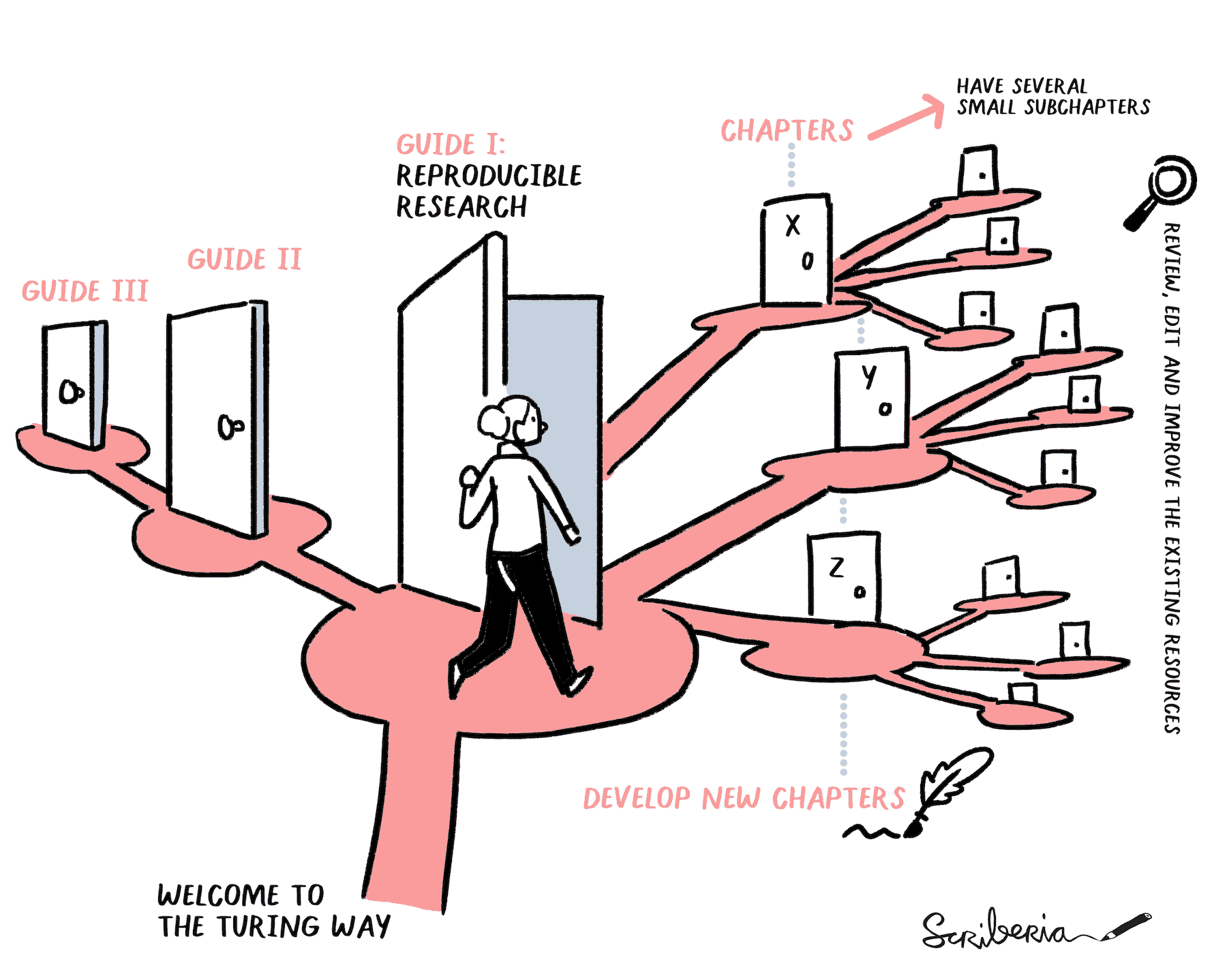Welcome#
Welcome to The Turing Way handbook to reproducible, ethical and collaborative data science.
The Turing Way project is open source, open collaboration, and community-driven. We involve and support a diverse community of contributors to make data science accessible, comprehensible and effective for everyone. Our goal is to provide all the information that researchers and data scientists in academia, industry and the public sector need to ensure that the projects they work on are easy to reproduce and reuse.
Top Tip
The Turing Way is not meant to be read from start to finish. Start with a concept, tool or method that you need now, in your current work. Browse the different guides that make up the book, or use the search box to search for whatever you would like to learn about first.
All stakeholders, including researchers, software engineers, project leaders and funding teams, are encouraged to use The Turing Way to understand their roles and responsibility of reproducibility in data science. You can inspect our resources on GitHub, contribute to the project as described in our contribution guidelines and re-use all materials (see the License).
Please join our Slack Workspace to connect and discuss your ideas or suggestions with The Turing Way members.
Fig. 1 The Turing Way project illustration by Scriberia. Zenodo. http://doi.org/10.5281/zenodo.3332807#
Different Pathways#
Our Community#
The Turing Way community is dedicated to making collaborative, reusable and transparent research “too easy not to do”. That means investing in the socio-technical skills required to work in a team, to build something more significant than any individual could deliver alone.
The Turing Way is:
a book
a community
a global collaboration
We hope you find the content in the book helpful. Everything here is available for free under a CC-BY licence. Please use and re-use whatever you need, for any purpose.
The book is collaboratively written and open from the start. To make this project truly accessible and useful for everyone, we invite you to contribute your skills and bring your perspectives into this project. To join this community, please read our contribution guidelines and ways to get in touch. More information about the community and the project is available in the Community Handbook. We look forward to expanding and building The Turing Way together.

Fig. 2 The Turing Way project illustration by Scriberia. Original version on Zenodo. http://doi.org/10.5281/zenodo.3695300.#
Although The Turing Way receives support and funding from The Alan Turing Institute, the project is designed to be a global collaboration. We have contributions from across the UK, and from India, Mexico, Australia, USA, and many European countries. Chapters have been written, reviewed and curated by members of research institutes and universities, government departments, and industry. We are committed to creating a space where people with diverse expertise and lived experiences can share their knowledge with others to allow us all to use data science to improve the world.
Translation
Call for translators! We’re looking for contributors to help translate this space for everyone! Read more about our translation workflow and how you can contribute to it in the translation chapter.
We value the participation of every member of our community and want to ensure that every contributor has an enjoyable and fulfilling experience. Accordingly, everyone who participates in The Turing Way project is expected to show respect and courtesy to other community members at all times. All contributions must abide by our code of conduct.
History#
The book started in January 2019 as a guide for reproducibility, covering Version Control, Code Testing, and Continuous integration. However, technical skills are just one aspect of making data science research “open for all” and so in February 2020, The Turing Way expanded into a series of guides: Guide for Reproducible Research, Guide for Project Design, Guide for Communication, Guide for Collaboration, and Guide for Ethical Research.
Citing The Turing Way#
All material in The Turing Way is available under a CC-BY 4.0 licence.
You can cite The Turing Way through the project’s Zenodo archive using DOI: 10.5281/zenodo.3233853.
The citation will look something like:
The Turing Way Community. (2022). The Turing Way: A handbook for reproducible, ethical and collaborative research. Zenodo. doi: 10.5281/zenodo.3233853.
Please visit the DOI link though to get the most recent version - the one above is not automatically generated and may be out of date. DOIs allow us to archive the repository and are useful for tracking the work in academic publications.
You can also share the human-readable URL to a page in the book, for example, https://the-turing-way.netlify.app/reproducible-research/overview/overview-definitions.html, but be aware that the project is under development and these links may change over time. You might want to include a web archive link, such as: https://web.archive.org/web/20191030093753/https://the-turing-way.netlify.com/reproducibility/03/definitions.html, to make sure that you do not end up with broken links everywhere!
We really appreciate any references that you make to The Turing Way project in your work, and we hope it is useful. If you have any questions, please get in touch.